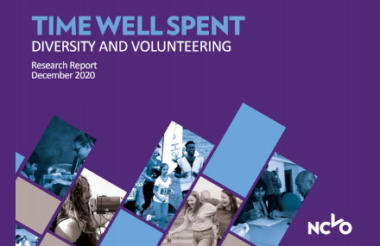People from minority groups are less likely to volunteer, and when they do they have a worse experience, according NCVO research about diversity and volunteering.
In a report published at the end of last year, Time Well Spent: Diversity and Volunteering, NCVO urges charities to take a more proactive and flexible approach to diversity and inclusion when it comes to attracting and retaining volunteers.
The report is based on NCVO’s Time Well Spent research from 2019, with workshops and digital engagement with voluntary organisations and phone interviews with key stakeholders.
According to NCVO’s 2019 research, recent volunteers are more likely to be older and from higher socio-economic groups. It also found that people from BAME backgrounds were less likely to volunteer frequently.
People from a BAME background were also less likely to say getting involved is easy and straightforward (83% vs 91%). They were also less likely to feel appreciated (73% vs 84%), or that they belonged (77% vs 85%).
Overall people with a disability were as likely to volunteer as people without a disability. However, younger disabled people were more likely than older disabled people.
People with a disability were more likely to report tensions and conflict (32% vs 26%).
Priya Singh, chair of NCVO, wrote in the foreword: “Put simply, volunteering is not inclusive of all people and communities both in terms of levels of participation and the volunteer’s experience of being involved.”
Charity attitudes
NCVO highlights that charities are at different stages and can lack capacity to focus on addressing diversity and inclusion issues.
“Typically volunteer managers lack capacity, many are part time, and their role includes all aspects of volunteer recruitment and management,” the report says.
It emphasises the importance of leadership buy-in and a willingness for culture change, saying: “Embedding diversity and inclusion within organisations can also be challenging in organisations with leaders who have been at the helm for many years. Organisations noted that these leaders are sometimes too embedded in the ‘old culture’ to want to make any lasting change.”
However, the report says diversity and inclusion is a higher priority now than it has been previously.
“The overall sense from respondents was that organisations are thinking about diversity more and trying to be more active in this area (even if they may not have done much to date),” the report says.
Charity-wide approach
NCVO stresses that improving diversity in volunteering needs to be part of a “holistic” and charity-wide approach that prioritises inclusion.
The report recommends charities be honest about what their challenges and willing to change. They should have diversity as “a priority at strategic level” and set clear objectives with training.
It encourages charities to make sure they are “valuing the small steps”, involve volunteers on the journey and make sure they “evaluate cultural practice”.
NCVO found that having a strategy in place with support from senior leaders, as well as “responsibilities dispersed across the organisation” was evident where organisations had made progress.
It adds: “Some felt that organisations also benefited from staff expertise (preferably at senior level) dedicated to driving diversity and inclusion within the organisation. This was seen to avoid activities being done in isolation and to create a ‘golden thread’ that ran through the organisation as a whole.”
It says that “clearly articulating the benefits of increasing diversity” to the organisation helps to convince people to act.
More flexibility in roles
Creating flexible roles “that adjust around the diverse lives of volunteers” is one of the key recommendations to make volunteering more accessible.
NCVO also urged charities to avoid “unrealistic expectations” from staff with fixed ideas about what volunteers would do.
The report also encourages organisations to consider recruitment and support process, make them as simple as possible by considering alternatives to long application forms, such as video.
Developing a wider variety of volunteer roles can also help to increase diversity.
“More volunteering roles to offer has meant more volunteers from different backgrounds. Being flexible about roles and also having short-term opportunities has worked well,” one participant told researchers.
Change the language and images
The report advises charities to consider the language they use to make sure it is inclusive.
“Some organisations had taken active steps to review communication materials, including volunteer roles to look at the impact of the language being used and to make it as inclusive as possible,” the report says.
It adds that volunteers should see people like them in the charity’s external communications, like photos on its website.
Charities need to be proactive
NCVO concluded: “How we talk about volunteering may need a re-think in order to be more inclusive.”
It says some charities need to “face uncomfortable realities” and warns that: “The structures of some charities can sometimes recreate power dynamics rooted in colonialism and paternalism between staff, volunteers and service users that can lead to discrimination and oppression.”
To address the problem, charities need to go further than being “open to everyone”, NCVO says.
“Proactive and targeted engagement, recruitment and support for volunteers enables diversity,” the report says. “Expecting a diverse pool of volunteers to happen without active effort is unrealistic.”
Impact of Covid
The pandemic has changed how many organisations approach volunteering, with new roles being created, but some new difficulties.
A case study from RNIB in the report says: “Covid-19 has brought about some challenges in making their volunteering inclusive. They (like many in the sector) have seen a reduction in their volunteer base, particularly those with additional needs. This has meant they haven’t yet been able to fully see the advantages of creating a more inclusive programme.”
For others, the report says, having a high proportion of older volunteers has been a problem during the pandemic, so they have been “reaching out to people who had never volunteered before”.
Sarah Vibert, director of membership and engagement, said: “The Covid-19 pandemic has prompted organisations across the country to offer more flexible, digital volunteering options, which may have helped attract a more diverse range of volunteers. There is further work to do to understand the long-term impact of this.”
Related articles










